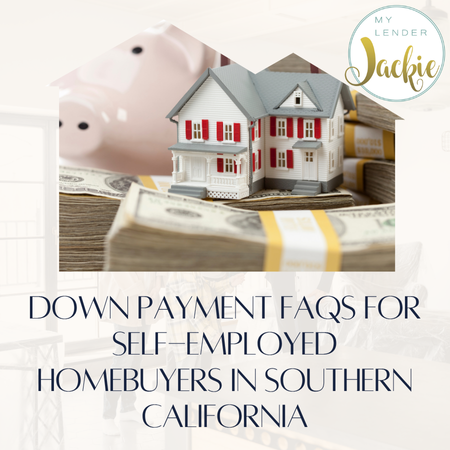Buying a home while running your own business adds extra moving parts—especially in Southern California where home prices, lender expectations, and cash-reserve requirements can be higher. After so many years helping our self-employed clients access the financing they need, we’ve got the answers to some of the most frequently asked questions. One topic we often hear about is down payment options for borrowers who are self-employed.
Below you will find our clear answers to the questions self-employed borrowers ask most about down payments, plus practical steps to prepare your funds and documentation.
What is the minimum down payment for self-employed homebuyers?
 There’s no single answer—down payment minimums depend on the loan program, the lender’s overlays, the purchase price (conventional vs. jumbo), and how you document income. Sometimes, self-employed borrowers will qualify for a wide range of loan types and can choose the down payment that best fits them. In other cases, self-employed borrowers might run into challenges qualifying for a conventional or FHA loan and will need to take another route.
There’s no single answer—down payment minimums depend on the loan program, the lender’s overlays, the purchase price (conventional vs. jumbo), and how you document income. Sometimes, self-employed borrowers will qualify for a wide range of loan types and can choose the down payment that best fits them. In other cases, self-employed borrowers might run into challenges qualifying for a conventional or FHA loan and will need to take another route.
Typical ranges you’ll see:
- Conventional loans: 3%–20%. First-time buyer programs may allow 3% but lenders often prefer 10%+ for self-employed borrowers unless you have strong documentation and reserves.
- FHA: 3.5% — possible for some buyers but FHA has borrower and occupancy rules that may not suit investors or large Down Payment Assistance situations.
- VA: 0% for eligible veterans, but income qualification still applies and documentation is required.
- Bank-statement / non-QM: 10%–30% — these programs are popular for self-employed borrowers with complex income but they often require higher down payments (and sometimes stronger credit).
- Jumbo loans: 10%–25% or more depending on the lender and the loan amount.
This is the bottom line: if you’re self-employed in Southern California, budgeting for at least 10% down gives you access to the widest set of programs and faster approvals—especially in higher-priced markets. If you’re not sure what type of loan will be the right fit, just reach out to talk with a loan officer who can guide you through the process.
Can I use business funds for a down payment on a house?
Yes, but with some important caveats. We can accept business funds when those funds are properly documented as belonging to the borrower and when using them doesn’t jeopardize business operations.
These are the typical requirements:
- Clear bank-to-bank transfers from business to personal accounts showing the funds as owner draws, distributions, or salary.
- Corporate documentation (for corporations/LLCs) such as resolutions, distribution notices, or a statement from an accountant explaining the transfer.
- Evidence that the business still has sufficient working capital after the transfer (lenders assess whether the business remains healthy).
- Seasoned funds—lenders prefer funds on deposit for a minimum number of days (often 60–90) or a documented paper trail showing origin.
If you’re using an LLC or corporate bank account, expect extra underwriting. We will need to document proof that you can legally withdraw funds and that withdrawals are not loans or disguised liabilities.
Can gift funds or investor money be used for the down payment?
Gift funds from family are commonly accepted for owner-occupied purchases; you’ll need a signed gift letter and source documentation from the donor. Many conventional programs accept gifts for the down payment, but some programs limit gift use or require that gifted funds not count toward cash-reserve requirements. Using investor funds (e.g., private loans) is more complex—most lenders will treat those as liabilities unless they are documented as forgiven gifts or subordinated appropriately. We can help you navigate this and make sure you’re applying for a loan that aligns with your needs.
What documentation should I have ready if I plan to use business funds?
Be prepared with all of this if you’d like to use business funds for your down payment:
- 12–24 months of personal and business bank statements.
- Business tax returns (if available) and profit & loss statements.
- Evidence of owner draws/distributions and the business ledger entry that supports them.
- Corporate resolutions or accountant letters for corporate entities.
- Seasoning of funds (evidence funds have been in your account for required time or a clear path showing lawful transfer).
How do down payment expectations differ in Southern California?
It’s likely no secret to you that Southern California’s higher home prices and competitive offers mean lenders and sellers expect well-prepared buyers. Mortgage underwriters will pay special attention to your reserves (how many months of mortgage you can cover after closing), the source of your down payment funds, and whether your business will remain operational post-closing. For luxury home purchases or jumbo loan, expect larger down payments and stronger documentation.
Don’t let the challenges overwhelm you; instead, start moving toward your goal with these steps:
- Talk to your lender early—get a pre-application so you know what programs you qualify for.
- Work with your CPA to document owner draws, distributions, and to prepare clear profit & loss statements.
- Move funds early and document transfers (avoid last-minute large deposits without explanation).
- Consider bank-statement or asset-based programs if your tax returns don’t reflect your cash flow.
- Keep at least 3–6 months of reserves after the down payment for most conventional loans; more for jumbo purchases.
We are ready to walk with you every step of the way. Contact us any time to learn more!

